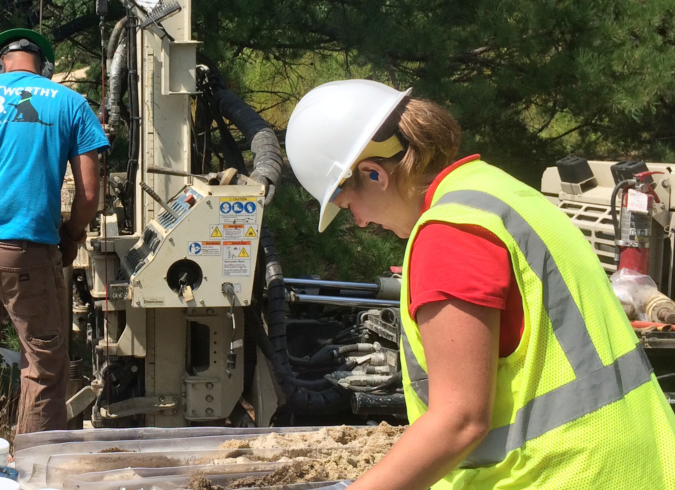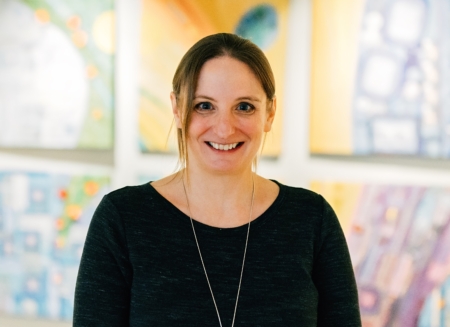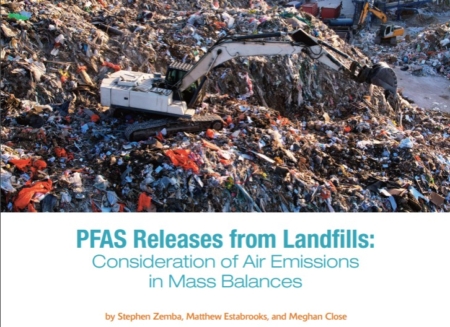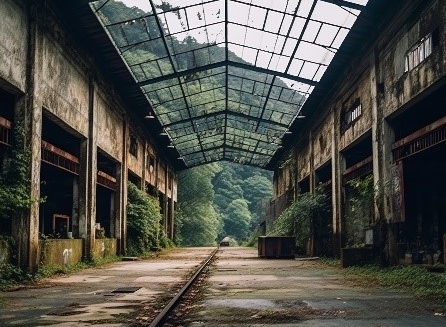Engineers are some of the unsung heroes of our everyday lives. They are behind nearly everything that we encounter daily – from office buildings and parking garages to roadways and overpasses. In 1951, the National Society of Professional Engineers founded Engineers Week, dedicated to ensuring a diverse and well-educated future engineering workforce by increasing the understanding of and interest in engineering and technology careers.
This year’s theme is Pioneers of Progress. As a woman with no background in science, technology, engineering, and mathematics (STEM), I wanted to sit down with some of Sanborn Head’s women to learn more about how engineering has shaped their lives and professional development.
I reached out to six colleagues, whose experience spans from two to 20 plus years, and they graciously agreed to participate and answer some of my questions:
- Anna Campbell, Geologist
- Lilly Corenthal, Sr. Project Hydrogeologist
- Joan Fontaine, PE, Sr. Vice President
- Sarah Perry, Engineer
- Sarah Pope, EIT, Project Engineer
- Catherine Sobchuk, PE, Sr. Project Engineer

How long have you been in the Architecture/Engineering/Construction (A/E/C) industry?
AC: I have been involved in the industry since Fall 2017.
LC: 4 years.
JF: I’ve been in the natural gas industry since 1996. For the 10 years prior to that, I worked as both a radiological and environmental engineer for two different General Electric facilities.
SPerry: My B.S. degree is in Civil Engineering, but Sanborn Head is my first taste of the true engineering world.
SPope: I have been working in this industry for almost two years.
CS: I have been in the industry since I graduated in June 2014. I took a break for grad school between August 2017 and June 2018 and have been back since!
Have you had any academic/professional female mentors?
AC: I have been lucky to have both. In my research group at UMass Amherst, I was mentored by an amazing master’s student who I still catch up with regularly. And at both my previous firm and at Sanborn Head, I have enjoyed close working relationships and guidance from mid-level female coworkers.
LC: My supervisor is a woman and she has been an outstanding mentor throughout my four years here.
JF: I consider myself fortunate to have had several mentors throughout the course of my 35-year career, but none of them have been women. I think that is because my primary area of professional expertise has been in the natural gas sector, which has very few women in technical positions.
SPerry: I had two distinct female mentors in college; a professor and a military professional who I still talk to on a monthly basis. They dedicated their time to students while encouraging them to always do more.
SPope: I have had female instructors and have worked with females in seniority positions in the workplace. While not formal mentors, some of them have certainly provided academic and professional insight and have been positive role models.
CS: Academically, I had professors I admired, but they were not in a mentorship role for me. I think I could have (and looking back, should have) spoken with them more and asked them questions about their career, how they got there, how they balance work/family, what they would have changed, etc. At the time, I don’t think I was as curious/aware of what being a woman in STEM is like. Professionally, I’ve worked for two great women at Sanborn Head. I feel like I can ask them anything, and they will answer openly and honestly. They have provided valuable feedback for my professional career, which I think is important to receive from a fellow woman in STEM. Both will also give their own advice without being prompted by me, which is very much appreciative, because sometimes I feel like I don’t always know what to ask.
What misconceptions do you think people typically have about engineers/scientists? Do you think they’re true?
AC: Some may think that scientists are tucked away in a lab all day, socially awkward, and completely obsessed with their work. Clearly, we aren’t tucked away in a lab all day (e.g. the epic farmer’s tans), we aren’t THAT awkward, and while we are passionate about our work, that attitude makes us passionate about a lot of other things in our lives as well.
LC: I think one misconception is that engineering is not a creative profession. It takes a lot of creative thinking to work on engineering projects, solve problems, and figure out the best path forward.
SPerry: I think the general misconception about engineers is that their work is done solely behind a computer. It’s accurate to say engineers use the technical resources available but the solutions seem to stem a great deal from the engineer’s experience, field observations, and even tapping into the knowledge of professionals who have double the experience.
SPope: I think one perception people have is that engineering work basically consists of science and math, rather than a comprehensive and integrated application of a broad education, training, and experience.
CS: That we can’t interact with people! I think to some extent, this can be true, because the social aspect of engineering (and especially consulting) often isn’t emphasized in school. It’s so important for engineers to have the technical skills but also be able to explain the projects/solution to non-technical audiences.
What difficulties have you faced as a woman in a typically male-dominated field?
AC: The most difficult aspect of working in a male-dominated field is how I must present myself in order to be listened to. Due to all sorts of factors, I must be nice and ask everything with a smile in order to get accomplished what man could just ask to be done outright. It adds another level of complexity when you are alone in the field with a set of tasks to be completed by others who are not inclined to listen to you in the first place.
LC: Most of the day-to-day challenges I’ve noticed have been more subtle such as people turning to my male coworkers first on a job site or occasionally hearing some jokes that I’d prefer not to hear or needing comparable restroom facilities. I do wish that I had the opportunity to work under and learn from more women in senior positions, but hopefully that will be changing as the profession evolves.
JF: In the early years working in the gas industry before the internet and email, I would need to call vendors to get information on equipment (e.g., valves, pumps, heat exchangers) and I was asked more than once if I was calling from the accounting department. Once I started asking specifics about the equipment, they figured out quickly that was an ignorant question.
SPerry: I have experienced difficulties in my military career, but I have not yet encountered difficulties in my engineering career.
SPope: My experience in the professional working world is limited. However, I cannot say that I have faced difficulties as a woman in either academic or professional settings. I simply try to uphold the standards I have set for myself.
CS: The first thing that comes to mind is a different treatment on construction sites. Workers will be particularly interested in what you’re doing, and they’ll talk to you and ask you questions while you’re trying to work and just hang around a bit longer. They also try to help, which is a nice thing to do, but loses its value when they’re only asking because I’m a girl. They would listen to me if I gave a directive, but the response made it seem like they were doing me a favor instead of just doing their job. It’s a nuanced difficulty, but I don’t think my male colleagues have the same experience.
What differences have you noticed between yourself and young female engineers/scientists and older, more experienced ones?
AC: The greater confidence amongst senior scientists appears to diminish the difficulties that myself and other junior staff members experience.
LC: I have not noticed big differences between generations. In general, I’d say there is a great culture among women engineers and geologists of supporting and promoting each other – we are often great friends as well as colleagues!
SPerry: I have noticed experienced female engineers carrying confidence much greater than most engineers. Most professionals face challenges in their career but I believe it is slightly more unique for females in male-dominated fields, specifically those who have been in field for years.
CS: I’ve noticed experienced engineers to be more confident in group settings, especially when they are often the only female in the group. They know what they’re talking about and they aren’t afraid to speak up and include their opinion and technical knowledge in the conversation. That is something that I’m learning to be more comfortable with, especially as I sit on more calls/meetings.
How have you noticed the industry change since you entered the workforce?
JF: From a technical standpoint, the challenges of providing engineering services in a regulated environment has continually increased due to more complex regulatory requirements and the scrutiny the natural gas industry is under. Engineering overall has become much more specialized and the diversity of where engineers can work (e.g., range of industries, areas of specialty) seems to have really increased since I first entered the workforce in the 1980’s. From a ‘women in the industry’ standpoint, I would like to be able to say that I’ve seen a significant increase in the number of women in the natural gas sector, whether in the consulting or utility sectors. But I really haven’t observed a notable increase. It’s not uncommon for me to be in a meeting and be the only woman in the room. The exception to that is when the issue is an environmental one. I have observed that both consulting firms and utilities seem to have more women who have an environmental engineering background since I entered the workforce.
What do you think are some effective methods of community outreach/involvement to improve the knowledge of STEM/STEM careers?
AC: I think engaging with the community at an early age is important to growing female representation in the industry. It would be great to see Sanborn Head getting involved in career fairs/panels at the high school level as well as with university students who have already begun to specialize.
LC: I know Sanborn Head participates in educational activities in local schools during Engineers Week and has hosted student interns. It would be great if Sanborn Head participated in more educational and outreach activities in our communities. I think the profession and our society will truly benefit by promoting diversity in STEM at all career stages, including most importantly from a young age.
JF: I am aware that some staff volunteered at a local high school during Engineer’s Week. I think this type of outreach is a good thing. As with many things, a lot starts in the home. Parents and grandparents encouraging the children in their lives to pursue STEM-related activities such as Lego League and robotics programs is important. Encouraging children to get involved in home improvement projects and instilling a “can-do”, hands on mentality is important, too.
SPerry: In college, I was a member of the Society of Women Engineers (SWE) and found that speaking with professional, female engineers helped me understand the opportunities that are available.
SPope: I have participated in some of our STEM-related outreach efforts. I have visited both elementary and high schools to help students of various ages grasp what the engineering profession entails. One goal in these efforts is to help engineering seem less vague and more applicable to the students’ daily lives. I think young people need to understand that engineering is not necessarily limited to its more traditional aspects (e.g., building bridges or designing robots) and that it should not necessarily exclude an understanding of and appreciation for verbal and written endeavors and applications. School visits and volunteering in student activities (e.g. Destination Imagination, robotics clubs, career Q/A sessions) are some examples of positive and successful outreach.
CS: I know that some of our employees are involved with Engineers Without Borders, and that folks volunteer at their alma maters and help with things like senior capstone projects. I think it would be great to volunteer either in high schools or with local colleges to encourage STEM careers and provide mentorships to STEM college students.




